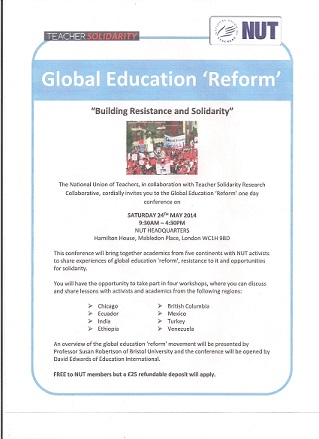New faces and base-building
 In studying urban teacher preparation (the hat I wear professionally when I’m not thinking about teacher unionism), I examine how school practices and organization influence teachers and students. To understand what goes on inside classrooms we have to look at the welter of powerful influences within schools and outside their walls. Blaming “teacher quality” for unequal academic achievement is an ideological assumption with little evidence.
In studying urban teacher preparation (the hat I wear professionally when I’m not thinking about teacher unionism), I examine how school practices and organization influence teachers and students. To understand what goes on inside classrooms we have to look at the welter of powerful influences within schools and outside their walls. Blaming “teacher quality” for unequal academic achievement is an ideological assumption with little evidence.
This same broader view explains why union officers are only as good as the movement that supports them. No matter how talented, smart, or radical an individual activist is, s/he must depend on the wisdom and courage of the movement s/he represents. Officers need to be directed and supported by members. For that to happen, the union needs democratic norms and policies. Another way officers are supported and nudged is through a caucus. NEA has semi-official committees that are called caucuses, and this has caused some confusion for teachers who are new to labor union activity. A union caucus is really an internal political party. It is independent of the union apparatus and receives no funding or help from the union. There is no time on the regularly scheduled agenda of the union for caucuses to meet. Within the caucus, union officers have no special power. They are equals. While their position within the union gives them insights and information other union members may not have, it should be understood that their role as officers has removed them from the day-to-day concerns and perspective of members.
If a caucus is primarily an electoral vehicle for a few talented people, it cannot serve the function it should. Moreover, using a caucus primarily to elect individuals miseducates members about what’s needed – an entirely different kind of union, one that draws its strength from member activity in their schools. Because the unions are so decrepit, sometimes what is conceived of as an educational campaign morphs into a real contest and the reformers win. But more often, activists are seduced by the illusion that if only they could replace the existing officers, the union would be substantially different.
Without their realizing it, activists who think this way have adopted the strategy the Communist Party used in its union work, a strategy imitated by unions like SEIU: mobilization of members on specific campaigns and advocacy of social justice – without building the union on the shop floor, that is, strengthening union democracy and having members direct the union. This situation gives elected officials power to speak on behalf of the workers (often for the leadership's own political purposes) without empowering them.
New faces at the top are limited in what they can accomplish on their own. Newly elected officers often face the problem of long-time staff who have their own ideas about how to organize. Officers can push for democratic practices but their position on the top inhibits their ability to make change from below. Both factors weaken the officers’ capacity to mobilize members and build the union in the schools.
Our enemies are quite aware of teachers’ fears and the unions’ political weakness with the public. Officers need a strong base in the schools. If/when teachers don’t have the legal right to bargain collectively or if their union can no longer defend them, they have to depend on one another in ways that are immediate and personal. We cannot alter power relations in the schools without (re)building the union on entirely different premises, starting with the idea that “the union” is not the person who is the president or the officers and staff. Of course leadership counts – as does teacher quality. But as with teacher quality, the quality of union officers depends on their being supported and being absolutely committed to leading members who will direct them. The education of union officers begins with their being members of reform caucuses committed to union democracy, building the union’s presence in the school, as well as fighting for social justice and mobilizing members in specific struggles.
Coming soon: The National Union of Teachers (NUT) which represents teachers in the UK and Wales, is hosting a research conference May 24-25 at its London headquarters about how to build international solidarity of teachers unions. Susan Robertson, a brilliant scholar, will start off the event. The event is path-breaking. Try to join us.
In June and July I’ll be blogging less frequently to catch up on research and revise “Urban Teaching: The Essentials,” with help from Herm Jerome, a NYC teacher and union activist who serves on the Board of Directors of Teachers Unite. You can still reach me with comments at drweinerlo@gmail.com. And I’ll be posting (those less frequently) on twitter , Facebook, as well as my blog here at New Politics.